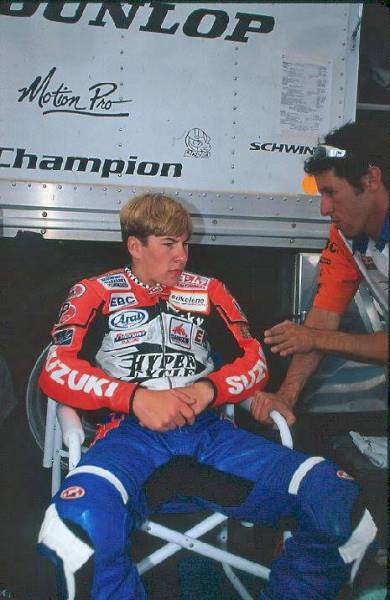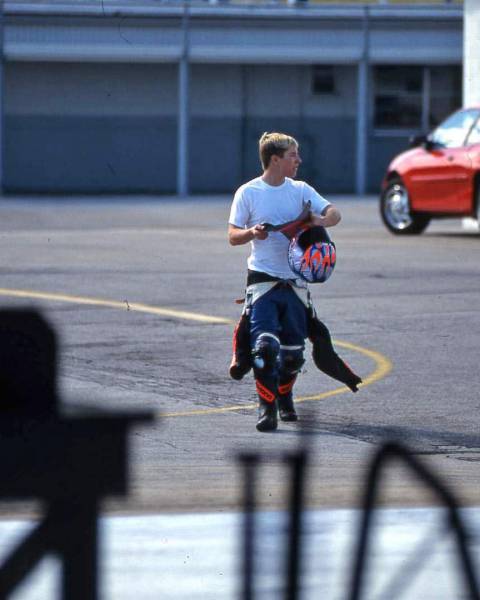Team Orders: Interesting Concept "...if I am going to let him win..."
In ’98, when faced with team orders most remained silent. But one boy spoke his mind.
by Dean Adams
Monday, February 21, 2022
The year was 1998 and, with just a few races left in the season, Canadian Steve Crevier found himself leading the AMA 600 Supersport title chase. It had been ten years since Suzuki had won the championship in the old 600 class, yet, thanks to fortune, Yoshimura's tuning and smart riding by Crevier, Suzuki had a legitimate shot at the most important championship in US roadracing.
If. If Crevier didn't have to battle his fellow Suzuki riders to the finish line and could concentrate on beating the Hondas and Yamahas. If.
1998 was one of the most physical seasons of 600 racing with seven different winners and at times more contact between the front-runners than you'd see in a short dirt track race.
After the customary AMA riders' meeting at one of the final races of the season, an American Suzuki's race manager waved all Suzuki and Suzuki support riders into a room. The door closed behind a not insignificant number of riders--probably more than fifteen--all with ties to Suzuki. The manager explained Suzuki's case in plain terms.
We have a shot at winning this championship, he said. If we do win it, Suzuki will sell a lot of motorcycles, Suzuki will wear the number one plate in a highly competitive class and we'll have massive bragging rights for a year. Then came the plea: Suzuki needs your help. We need Steve to finish as high up the order as possible in order to win the title. It would be great if he didn't have to battle his fellow Suzuki riders to do that ...
It didn't come across as direct team orders to let Crevier finish as the first Suzuki, but it was clear that Suzuki, who paid that roomful of men to race their motorcycles, would appreciate some quid pro quo for those checks that went out every month. Crevier didn't need a red carpet that led to victory circle, he just needed to not get knocked into the bales by his fellow GSX-R600 riders.
Most of the riders accepted the Suzuki manager's plea as the reality of their chosen profession. Some nodded their head in agreement enthusiastically, some merely mouthed okay and then returned their gaze to the carpeted floor. The room was quiet.
Then, from the very back of the room, where riders stood shoulder to shoulder, an unfamiliar voice with a southern accent called out. "Ah, okay, so do I get paid my win bonus if I let him win?"
Who the hell said that? Heads spun towards the back of the room. Who had the balls to ask that question? Aaron Yates? Josh Hayes? Jamie Hacking? Steve Rapp? Larry Pegram?
A 17-year-old boy with a really bad haircut and wearing his older brother's t-shirt sat on a chair and stared directly at the Suzuki racing manager. He'd asked. ".. 'Cause, if I am going to let him win, I think I should get paid my bonus," the boy, who had just begun racing Supersport full time that season, continued.
It was an impressive moment. Usually new or younger riders will do anything a manufacturer asks of them, so happy to have both a paid ride and faith shown that early in their career. This kid rider, though, stared straight ahead, surrounded by veteran riders, some of them champions themselves. He didn't look to his colleagues for support. He didn't look too happy about being asked to take a racing knee.
The racing manager swallowed hard and replied: "Yes, Nicky, we will pay win bonuses based on your finish positions .. ."
"Well, alright then," 17 year old Nicky Hayden said with a not terribly happy look on his face.
Steve Crevier, who had done all the hard riding and groundwork earlier in the season, rightfully won the 1998 AMA 600 Supersport championship. The next season Nicky Hayden was riding a Honda.
If. If Crevier didn't have to battle his fellow Suzuki riders to the finish line and could concentrate on beating the Hondas and Yamahas. If.
1998 was one of the most physical seasons of 600 racing with seven different winners and at times more contact between the front-runners than you'd see in a short dirt track race.
After the customary AMA riders' meeting at one of the final races of the season, an American Suzuki's race manager waved all Suzuki and Suzuki support riders into a room. The door closed behind a not insignificant number of riders--probably more than fifteen--all with ties to Suzuki. The manager explained Suzuki's case in plain terms.
We have a shot at winning this championship, he said. If we do win it, Suzuki will sell a lot of motorcycles, Suzuki will wear the number one plate in a highly competitive class and we'll have massive bragging rights for a year. Then came the plea: Suzuki needs your help. We need Steve to finish as high up the order as possible in order to win the title. It would be great if he didn't have to battle his fellow Suzuki riders to do that ...
It didn't come across as direct team orders to let Crevier finish as the first Suzuki, but it was clear that Suzuki, who paid that roomful of men to race their motorcycles, would appreciate some quid pro quo for those checks that went out every month. Crevier didn't need a red carpet that led to victory circle, he just needed to not get knocked into the bales by his fellow GSX-R600 riders.
Most of the riders accepted the Suzuki manager's plea as the reality of their chosen profession. Some nodded their head in agreement enthusiastically, some merely mouthed okay and then returned their gaze to the carpeted floor. The room was quiet.
Then, from the very back of the room, where riders stood shoulder to shoulder, an unfamiliar voice with a southern accent called out. "Ah, okay, so do I get paid my win bonus if I let him win?"
Who the hell said that? Heads spun towards the back of the room. Who had the balls to ask that question? Aaron Yates? Josh Hayes? Jamie Hacking? Steve Rapp? Larry Pegram?
A 17-year-old boy with a really bad haircut and wearing his older brother's t-shirt sat on a chair and stared directly at the Suzuki racing manager. He'd asked. ".. 'Cause, if I am going to let him win, I think I should get paid my bonus," the boy, who had just begun racing Supersport full time that season, continued.
It was an impressive moment. Usually new or younger riders will do anything a manufacturer asks of them, so happy to have both a paid ride and faith shown that early in their career. This kid rider, though, stared straight ahead, surrounded by veteran riders, some of them champions themselves. He didn't look to his colleagues for support. He didn't look too happy about being asked to take a racing knee.
The racing manager swallowed hard and replied: "Yes, Nicky, we will pay win bonuses based on your finish positions .. ."
"Well, alright then," 17 year old Nicky Hayden said with a not terribly happy look on his face.
Steve Crevier, who had done all the hard riding and groundwork earlier in the season, rightfully won the 1998 AMA 600 Supersport championship. The next season Nicky Hayden was riding a Honda.
— ends —





